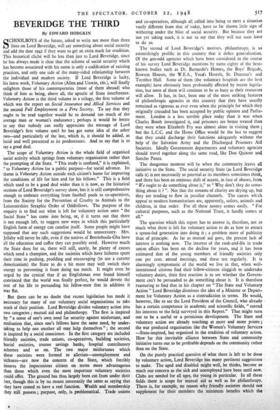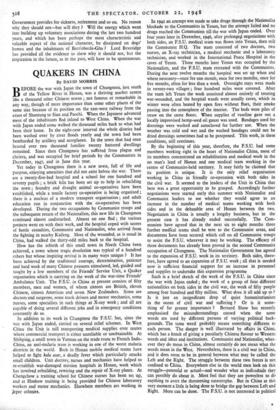BEVERIDGE THE THIRD
By EDWARD HODGKIN
SCHOOLBOYS of the future, asked to write not more than three lines on Lord Beveridge, will say something about social security and add the date 1942 if they want to get an extra mark for erudition. This historical cliché will be less than just to Lord Beveridge, since he has always made it clear that the scheme of social security which has become associated with his name is only a codification of existing practices, and only one side of the many-sided relationship between the individual and modern society. If Lord Beveridge is lucky, his latest work, Voluntary Action (Allen and Unwin, u5s.), will finally enlighten those of his contemporaries (most of them abroad) who think of him as being, above all, the apostle of State interference. Voluntary Action is the third volume in a trilogy, the first volume of which was the report on Social Insurance and Allied Services and the second Full Employment in a Free Society. To say that they ought to be read together would be to demand too much of the average man or woman's endurance ; perhaps it would be better to say that nobody can really appreciate the message of Lord Beveridge's first volume until he has got some idea of the other two—and particularly of the last, which is, it should be added, as lucid and well presented as its predecessors. And to say that is to say a good deal.
The scope of Voluntary Action is the whole field of organised social activity which springs from voluntary organisation rather than the prompting of the State. " This study is confined," it is explained, " to Voluntary Action for a public purpose—for social advance. Its theme is Voluntary Action outside each citizen's home for improving the conditions of life for him and for his fellows." This is a field which used to be a good deal wider than it is now, as the historical sections of Lord Beveridge's survey show, but it is still comprehensive enough to embrace everything from football pools to co-operatives, from the Society for the Prevention of Cruelty to Animals to the Leicestershire Seraphic Order of Oddfellows. The purpose of the enquiry is to find out what is left for voluntary action once " the Social State" has come into being, or, if it turns out that there is not enough left, to suggest new ways in which this particularly English form of energy can canalise itself. Some people might have supposed that any such suggestions would be unnecessary. Mrs. Jellaby will never be idle, even if the natives of Borrioboola-Gha have all the education and coffee they can possibly need. However much the State does for us, there will still, surely, be plenty of causes which need a champion, and the societies which have hitherto spent their time in pushing, prodding and encouraging (to use a current Americanism) the State to do a bit more may well switch their energy to preventing it from doing too much. It might even be urged by the cynical that if an Englishman ever found himself convinced that the world was finally perfect, he would devote the rest of his life to persuading his fellow-men that in addition it was flat.
But there can be no doubt that recent legislation has made it necessary for many of our voluntary social organisations to take stock of their position. Lord Beveridge divides voluntary action into two categories ; mutual aid and philanthropy. The first is inspired by " a sense of one's own need for security against misfortune, and realisation that, since one's fellows have the same need, by under- taking to help one another all may help themselves " ; the second is inspired by a social conscience. In the first category are included friendly societies, trade unions, co-operatives, building societies, burial societies, trustee savings banks, hospital contributory schemes and so on. The two major misfortunes which these societies were formed to alleviate—unemployment and sickness—are now the concern of the State, which forcibly insures the impecunious citizen on terms more advantageous than those which even the most important voluntary societies could offer. The ground has thus largely been cut from under their feet, though this is by no means necessarily the same as saying that they have ceased to have a real function. Wealth and membership they still possess ; purpose, only, is problematical. Trade unions and co-operatives, although all called into being to meet a situation vastly different from that of today, have so far shown little sign of withering under the blast of social security. But because they are not yet taking stock, it is not to say that they will not soon have to do so.
The second of Lord Beveridge's motives, philanthropy, is so astonishingly prolific in this country that it defies generalisation. Of the 400-odd agencies which have been considered in the course of his survey Lord Beveridge mentions by name eighty of the best- known bodies such as Dr. Barnardo's Homes, the Boys' Brigade, Rowton Houses, the W.E.A., You Hostels, St. Dunstan's and Toynbee Hall. Some of them (the voluntary hospitals are the best example) have obviously been profoundly affected by recent legisla- tion, but most of them will continue to be as busy as their resources will allow. It has, in fact, been one of the most striking features of philanthropic agencies in this country that they have usually remained as vigorous as ever even when the principle for which they originally crusaded has been accepted by public opinion and Parlia- ment. London is a less terrible place today than it was when Charles Booth investigated it, and prisoners are better treated than they were when Elizabeth Fry was almost alone in visiting them ; but the L.C.C. and the Home Office would be the last to suggest that they could discharge their functions adequately without the help of the Salvation Army and the Discharged Prisoners Aid Societies. Ideally Government departments and voluntary agencies should travel together along the same road, like Don Quixote and Sancho Panza.
The dangerous moment will be when the community leaves all initiative to the State. The social security State (as Lord Beveridge calls it) is not necessarily so paternal as its members sometimes think, and there has been an ominous shift of accent, in face of abuses, from " We ought to do something about it," to " Why don't they do some- thing about it ? ". Not that the streams of charity are drying up, but they are tending to flow in peculiar channels. The causes which appeal to modern humanitarians are, apparently, sailors, animals and children, in that order. For all these money comes easily. " For cultural purposes, such as the National Trust, it hardly comes. at all."
The question which this report has to answer is, therefore, not so much what there is left for voluntary action to do as how to attract a spoon-fed generation into doing it ; a problem more of publicity than of principle. As far as mutual aid goes, the present lack of interest is nothing new. The interest of the rank-and-file in trade union affairs has been on the decline for years, and it has -been estimated that of the young members of friendly societies only one per cent. attend meetings, and these not regularly. It is alarmingly symptomatic of the world we live in that, when well- intentioned citizens find their fellow-citizens sluggish to undertake voluntary duties, their first reaction is to see whether the Govern- ment can't be persuaded to do something about it. It is therefore reassuring to find that in his chapter on " The State and Voluntary Action " Lord Beveridge dismisses the idea of a Minister or Depart- ment for Voluntary Action as a contradiction in terms. He would, however, like to see the Lord President of the Council, who already has a certain competence in academic and scientific fields, " extend his interests to the field surveyed in this Report." That might turn out to be a useful or a pernicious development. The State and voluntary action are already touching at more and more points ; the war produced organisation like the Women's Voluntary Services —State-inspired, but organised in the tradition of voluntary action. How far this inevitable alliance between State and community initiative turns out to be profitable depends on the community rather than on the State.
On the purely practical question of what there is left to be done by voluntary action, Lord Beveridge has many pertinent suggestions to make. The aged and disabled might well, he thinks, become as much our concern as the sick and unemployed have been until now. Clubs are needed for all ages, the young in particular. In all these fields there is scope for mutual aid as well as for philanthropy. There is, for example, no reason why friendly societies should not supplement for their members the minimum benefits which th4 Government provides for sickness, retirement and so on. No reason why they should not—but will they ? Will the energy which went into building up voluntary associations during the last two hundred years, and which has been perhaps the most characteristic and valuable aspect of the national character, be dissipated on dogs' homes and the inhabitants of Borrioboola-Gha ? Lord Beveridge has provided all the evidence to show why it should not, but the inspiration in the future, as in the past, will have to be spontaneous.



































 Previous page
Previous page